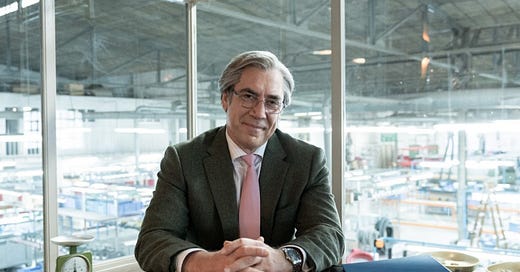The Good Boss
Javier Bardem gives a sumptuous performance as a factory owner who treats his employees like family in this Spanish black comedy.
What movies tell us… that’s a lie. — Julio Blanco
If you’ve spent more than a minute in the workforce, you have probably at some point had a boss who insisted that at their company, employees are family.
Sometimes they’re just BS-ing, but usually they really mean it — though it’s still BS. Unless you have a family where one kid is starving and the other gets 20 times as much to eat. Or where you can decide one day your sister is not actually your sister and never see her again.
Julio Blanco is one of those who really believes it. He inherited his scales factory, Basculas Blanco, and built it into an industry leader. He sees himself as a kindly father figure, someone responsible for not just his employees’ jobs but their overall happiness, which leads him to butt into their personal affairs and act as a backdoor manipulator.
He thinks he’s keeping everything in balance, like the antique scale that marks the entrance to his factory.
As played by Javier Bardem in the sharp Spanish satire, “The Good Boss,” Blanco isn’t a bad guy pretending to be a good guy, but someone who’s so thoroughly deluded himself about his own actions that the lines have become a complete blur.
We get a hint pretty early on that Blanco isn’t the warmhearted, altruistic image he projects. While recognizing some departing interns, a pretty one whispers to him that she loves him — before he sends her away with the rest. Clearly, this is a man who can compartmentalize.
Blanco and his wife, Adela (Sonia Almarcha), have no children but a contented life in their mansion with servants. She runs a dress shop in town and seems oblivious to his indiscretions. Early on, Blanco gives a job to the wayward son of a longtime employee, Fortuna (Celso Bugallo), who was arrested for assaulting Arab immigrants. The kid’s clearly trouble, but he wants to seem magnanimous.
Meanwhile, they’ve just had to do layoffs at the factory and one man, Jose (Óscar de la Fuente), isn’t taking it lying down. He sets up a protest campsite across the street from the company entrance, blaring at Blanco each day through a bullhorn as he cruises up in his Jaguar. He tries siccing the cops on him, to no avail.
This is vexing because Blanco is expecting any day the arrival of a committee judging for regional business excellence awards, and he very much wants to win. Blanco keeps a host of such prizes on his wall at home, a shrine that writer/director Fernando León de Aranoa returns his camera to repeatedly.
A new group of interns arrive, including Liliana (Almudena Amor), aka “the tall one” whom Blanco quickly turns his eye upon. She in turn seems quite receptive to his gaze and attentions.
Things at the factory aren’t going so well. His production manger, Miralles (Manolo Solo), is screwing things up left and right, ordering the wrong parts or getting the delivery logistics fouled up. A younger man, Khaled (Tarik Rmili), is clearly a better candidate. But Blanco grew up with Miralles and regards him as his closest friend.
So he does what he usually does: starts snooping, pulling people aside for conversations, subtly herding everyone this way and that. He talks to Miralles’ wife, Aurora (Mara Guil), about the marital problems driving his behavior. She tells Blanco to mind his own business, but the problem is in his mind, everything is about his business.
Blanco is the classic case of a successful man who thinks he knows everything and can solve any problem, so long as people listen to his advice and regard him as their superior. He’s blind to his own fatal flaw, even though he likes to quote Heisenberg’s Uncertainty Principle, which is often (mis)interpreted to mean that the observer unwitting affects that which they observe. Blanco thinks he can manipulate people and events to his will, whether they want to go along or not.
It’s a sumptuous performance by Bardem, playing a character who is not evil but winds up doing some rather unseemly things. The story plays out over the course of one week, with each day marking a new level of rising tension and aggravation that threaten to be Blanco’s undoing. During that time, Bardem transforms from a self-confident man, florid and genial, into a humbled wreck who’s finally seen the error of his ways.
“The Good Boss” is a sharp-elbowed, smart and darkly funny look at the depths of delusion.
Take it from someone who learned the hard way: unless your family’s name is the one on the building, you’ll always be an outsider.





